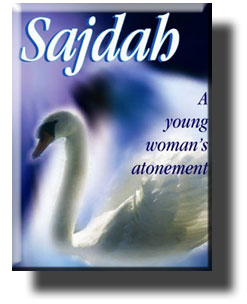FCNNEWSSOURCE
Final Call Editor Dora Muhammad answers a few questions posed by Ashahed Muhammad on her new book, “Sajdah,” which chronicles her healing from sexual abuse as a child, attempted suicide and rape as a teenager.
Ashahed Muhammad (AM): Why Sajdah for the title of the book?

Dora Muhammad (DM): Sajdah is an Arabic word that means “The Adoration.” It refers to the prostration position of prayer in Islam. On a personal level, it is the one word that I would use to describe me. Not only was I always prayerful, but also my adoration for Him through the way I live my life is essentially my way of showing God gratitude for His Mercy and Grace to me for bringing me to the Teachings of the Honorable Elijah Muhammad, as taught to me by the Honorable Minister Louis Farrakhan. To adore Allah (God), and His Word and Servants, is a consuming love that binds me in what I allow myself to think and do. So, it was an appropriate title for my testimony of my life in Islam.
AM: Your book is described as a book of healing and self-discovery. Was it difficult, or at times uncomfortable, for you to confront your hidden feelings?
DM: Of course, otherwise they would not be hidden. One of the primary ways my experiences have informed my life is that I am very vocal on issues and principles. It comes from the silence that women are condemned to because of society’s taboo of acknowledging and facing abuse. I used to become enraged when I was a teenager, and Minister Farrakhan would broach the subject of sexual abuse and rape in a lecture, and the audience would become so silent that you could hear an ant urinate on cotton. It was a pained silence of shame and fear. While our experiences will never leave us because it becomes our history, that does not mean we are wounded for life. If true healing occurs, there should only be scars left as a reminder, even some soreness, but eventually even that wears away for most wounds.
In the beginning, cleaning the wound is very painful and difficult. As a teenager, I decided that I was not going to let my abuse cripple the rest of my life. But when I was raped as a Muslim, it forced me to look at my past in a way that I had not before. The wound was not healed. It had a scab, a shabby covering that had only stopped the bleeding. That’s what happens to most of us, we find something to escape and cover the pain of our lives on the surface. It does not matter if the covering is positive or negative, if we have not faced the difficulties of learning the purpose and lessons of our experiences, we are not healed and we only live a life that appears to others as successful and comfortable, but in our hearts and souls, there is no ease in pretending. The silence does not create ease and comfort, maybe an illusion of it; only by facing our wounds will we be healed. My desire to be healed was greater than the pain of my wounds. It did not remove the difficulties and discomfort, it allowed me to challenge and transcend them.
AM: Was it therapeutic to present your personal and private struggles for the world to share?
DM: When I first began to share my experiences in public, I simply did it to give other women the strength to do the same. My struggle is not unique, so the world already knows my struggle. Abuse and rape is prevalent in our communities and in other cultures and nations. At some point, I did recognize that in teaching and sharing, I was able to further my own healing. Healing is hard work. So when my words would help another woman along her path of healing, it fortified my own feet to continue along my path. Reverend James Bevel taught once in one of his classes on atonement, that if you walked through a door, you should be able to tell someone else how to find that door and walk through it. Sharing my path of healing, and seeing the truth of it help others, sustains and expands my own process to continue to walk through more doors.
AM: Is your book specifically targeted at women?
DM: I wrote one dedication to women and another to men. Men need a healing from their sexual perversions and issues of control and domination. Masculinity has ruled the world–and the world is hell to live in because it is imbalanced. Men also need to learn how to deal with the women in their lives that share these experiences. I often wonder how many bad marriages and divorces are rooted in warped identities that occurred because of prior abuse that was not dealt with collectively. We suffer in this together. In order to bring balance to our lives, families, nation and the world, men and women must become a healing for one another.
AM: Thank you.
(“Sajdah: A Young Woman’s Atonement” is now available for $10 through The Final Call. Visit store.finalcall.com to order.)












